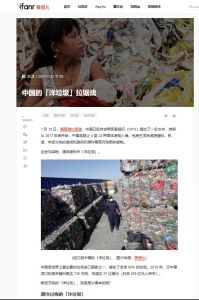Join getAbstract to access the summary!

Join getAbstract to access the summary!
Xiao Qinpeng
China’s Tug-of-War with Foreign Waste
Ifanr, 2018
What's inside?
Managing the world’s trash was a huge cash cow. Why did China suddenly decide to say no more?
Recommendation
In this punchy article, Xiao Qinpeng – writing for tech media platform Ifanr.com – asks uncomfortable questions about global waste management and globalization. Xiao points out obvious issues of pollution and the risk to public health that arise when one country imports another’s waste. Quoting the documentary Plastic Kingdom by director Wang Jiuliang, he also points to the waste management industry as a reflection of systematic layers of exploitation inherent in globalization. Researchers are developing trash-sorting robots, but until they are ready to take over, other countries will take China’s place and thus pollute and poison their own land and people. getAbstract recommends this story to anyone curious about how trash travels around the world.
Summary
About the Author
Xiao Qinpeng has a regular column on lifestyle and tech at Ifanr.com, a multimedia site for the latest international and domestic reports on tech.




























Comment on this summary